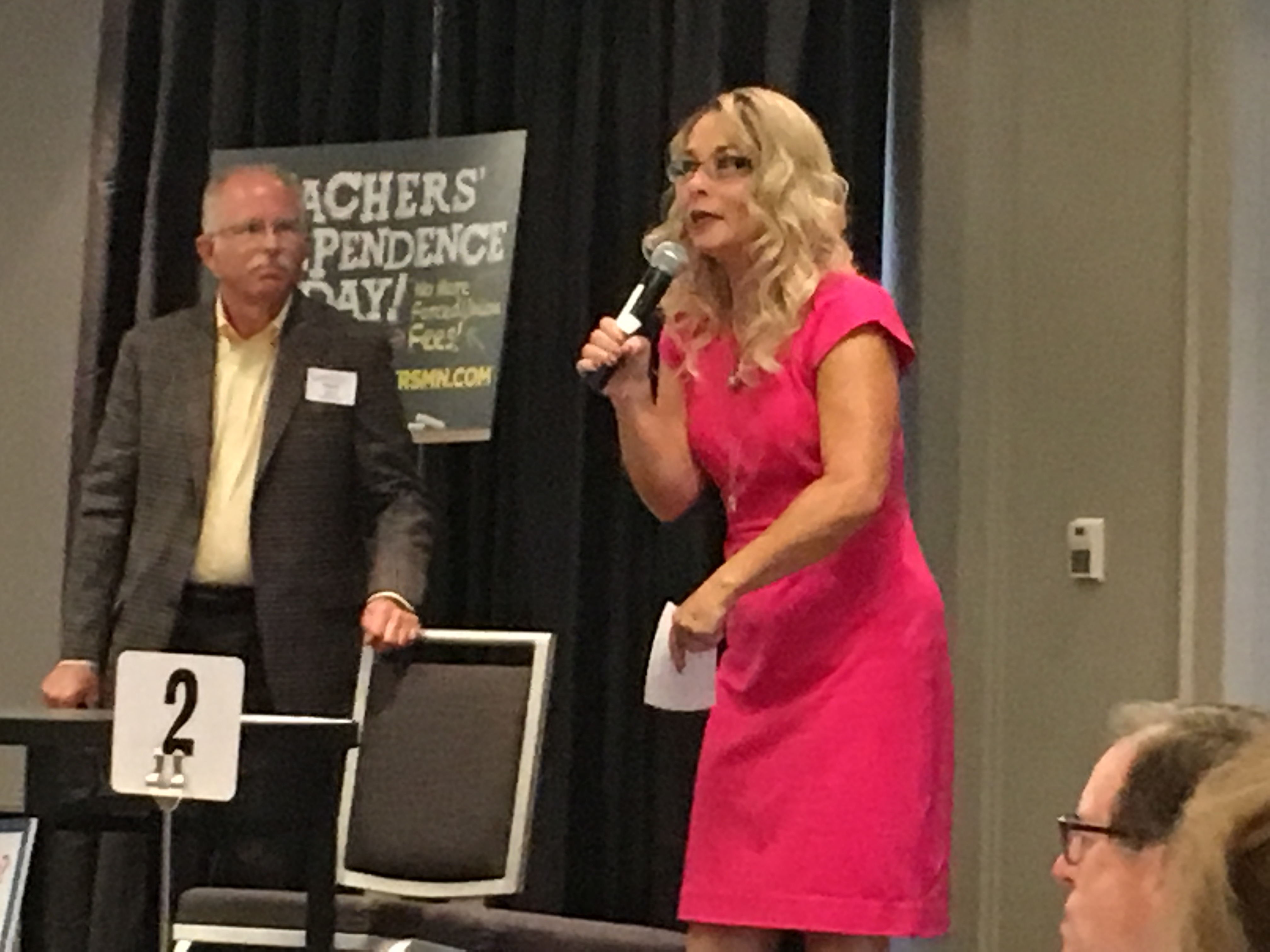

Share
As members of several different unions protested outside, I was seated at a table inside the Minneapolis Hilton at a September 17 lunch hosted by the Center of the American Experiment. The lunch was billed as “A Celebration of Janus v. AFSCME” — the recent U.S. Supreme Court case in which a 5-4 majority struck down the unanimous 1977 Supreme Court ruling which allowed public sector unions to collect fees from non-members to cover the costs of representing them. The luncheon’s featured speakers were Mark Janus, the plaintiff in the case, and Rebecca Friedrichs, who also was a plaintiff in a previous case before the Supreme Court, Friedrichs v. California Teachers Association.
The Center of the American Experiment — founded in 1990 and originally billing itself as “Minnesota’s Think Tank” — has in recent years emerged as perhaps the leading anti-union actor in Minnesota.
CAE filed an amicus brief in Janus v. AFSCME, taking the side of Mark Janus.
More notably, CAE has moved beyond authoring policy papers and op-eds to actively engage in direct outreach to union members via mail, phone calls and in-home visits by paid canvassers, all to encourage union members to quit or vote against their union.CAE recently staged an unsuccessful effort to persuade Minnesota home care workers to reject SEIU’s United Home Care Workers Minnesota. And now, in the wake of the Janus decision, CAE is targeting Minnesota teachers.
As I ate and waited for the speakers to begin, I listened to the conversations around me.
“Did you see the gang outside?” one person asked another. “They didn’t look like teachers.”
“Teamsters,” the other person replied.
Several people parted the closed curtains in the room to peer out the windows at the demonstrators.
Later, as CAE vice president Kim Crockett began the program, she struggled to be heard over the blaring horn of the giant Teamsters Local 120 semi-trailer truck outside, which rang out briefly.
Crockett highlighted CAE’s post-Janus efforts to reach out to Minnesota teachers, including mailings and a website, with the goal of persuading teachers to opt out of their union. Samples of postcards mailed to teachers were on the tables. “We don’t want to tell people what to do,” Crockett insisted. “Unions have been doing that for 41 years.” She urged the people at the lunch to “adopt a teacher” and reach out to them as part of the CAE’s anti-union campaign.
The room at the Hilton was set up with 16 tables of nine, a far smaller crowd than I’ve observed when I’ve occasionally attended CAE lunches in the past.
The bulk of the time was taken up by Mark Janus, who is now a former State of Illinois employee who was represented by AFSCME, and Rebecca Friedrichs, now a former kindergarten teacher who was represented by the California Teachers Association.
The two passed a microphone back and forth as they related the stories of their now-famous cases, which were bankrolled by right-wing foundations funded by anti-union billionaires (no mention, however, of who picked up the legal fees).
As Friedrichs and Janus spoke, I took notes on my phone, not wanting to be too conspicuous writing in a reporter’s notebook.
I’m reluctant to let this brief account of the luncheon become a platform for their views.
My main takeaways:
Friedrichs, for 28 years a public school kindergarten teacher, shared how she attended a conference hosted by the Christian Educators Association where she found inspiration to become involved.She said she prayed to God about what to do and “I guess He picked me.”
Friedrichs said, “God doesn’t ask a girl to do what He did” only to lose.“We knew He had a plan and it was a good plan.”
“I always tell people I fumbled the ball on the one yard line,” Friedrichs said. “But my buddy Mark picked up the ball.”
Mark Janus, formerly a State of Illinois public employee and AFSCME fee-payer, didn’t claim like Friedrichs to have God on his side. But his account ignored the goals of the anti-union forces who were on his side and why they backed him.
As Janus told his story, when he saw union fees deducted from his first State of Illinois paycheck, “I thought, I didn’t sign up for this.” Years later, he said, he came to the point where he simply thought “enough is enough” and contacted the Illinois-based Liberty Justice Center for help. (Following the Supreme Court’s ruling in Janus v. AFSCME, Mark Janus now works for Liberty Justice Center).“We’re not bashing unions,” Janus claimed. “We’re not trying to put unions out of business.”
An audience member asked a question about the history of Illinois public employee wages. Janus replied that workers years ago were underpaid, but because of collective bargaining, public employee wages increased. What? Doesn’t Janus’s own answer prove the point that public employees gain from collective bargaining?
Friderichs hawked her new book, “Standing Up to Goliath: Battling State and National Teachers’ Unions for the Heart and Soul of Our Kids and Country.” She urged the audience, “stand up to the bully.”
“On that note,” CAE’s Kim Crockett said, “the Teamsters have gone home so it’s safe to leave.”
Steve Share is the Editor of the Minneapolis Labor Review

